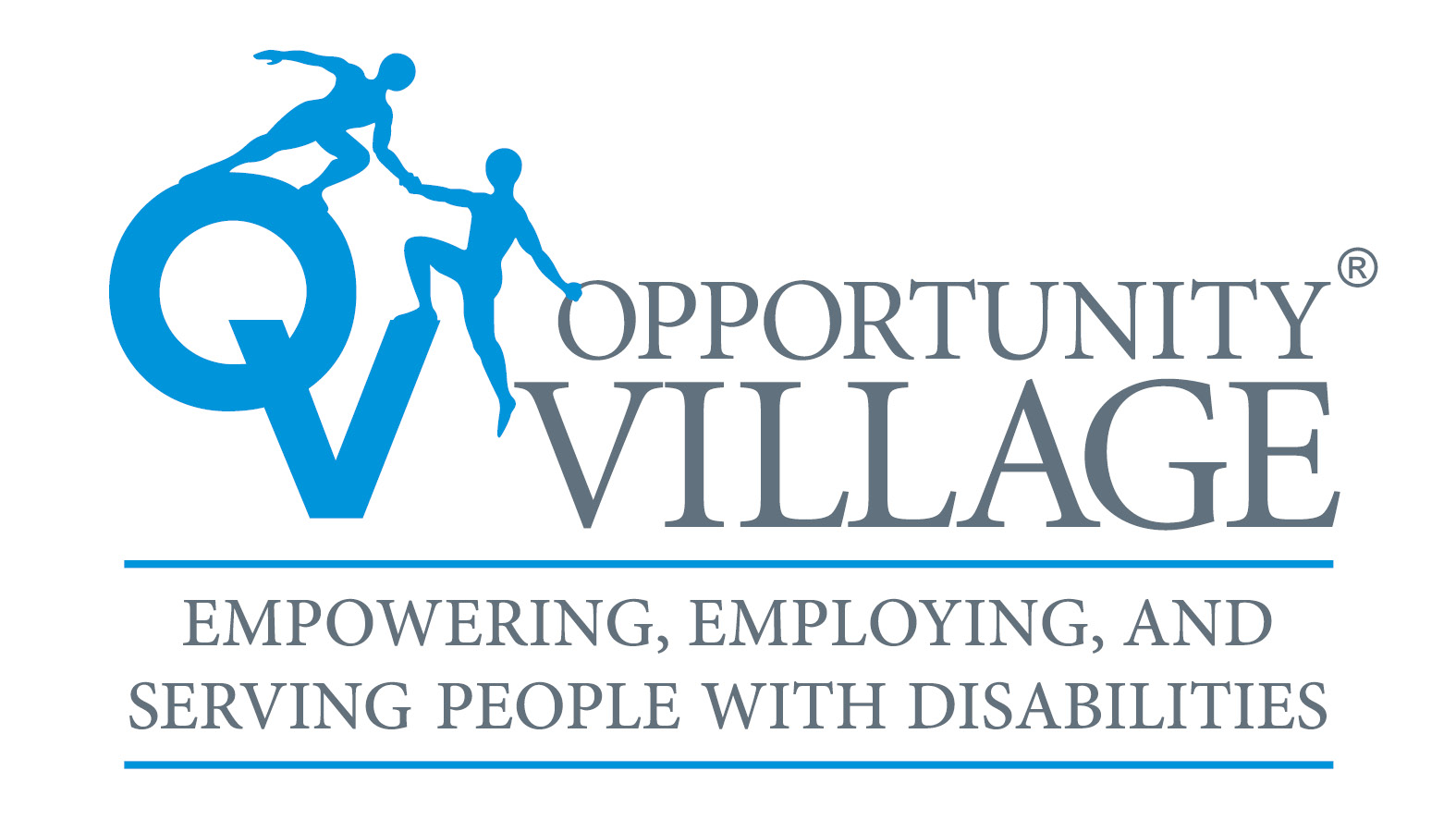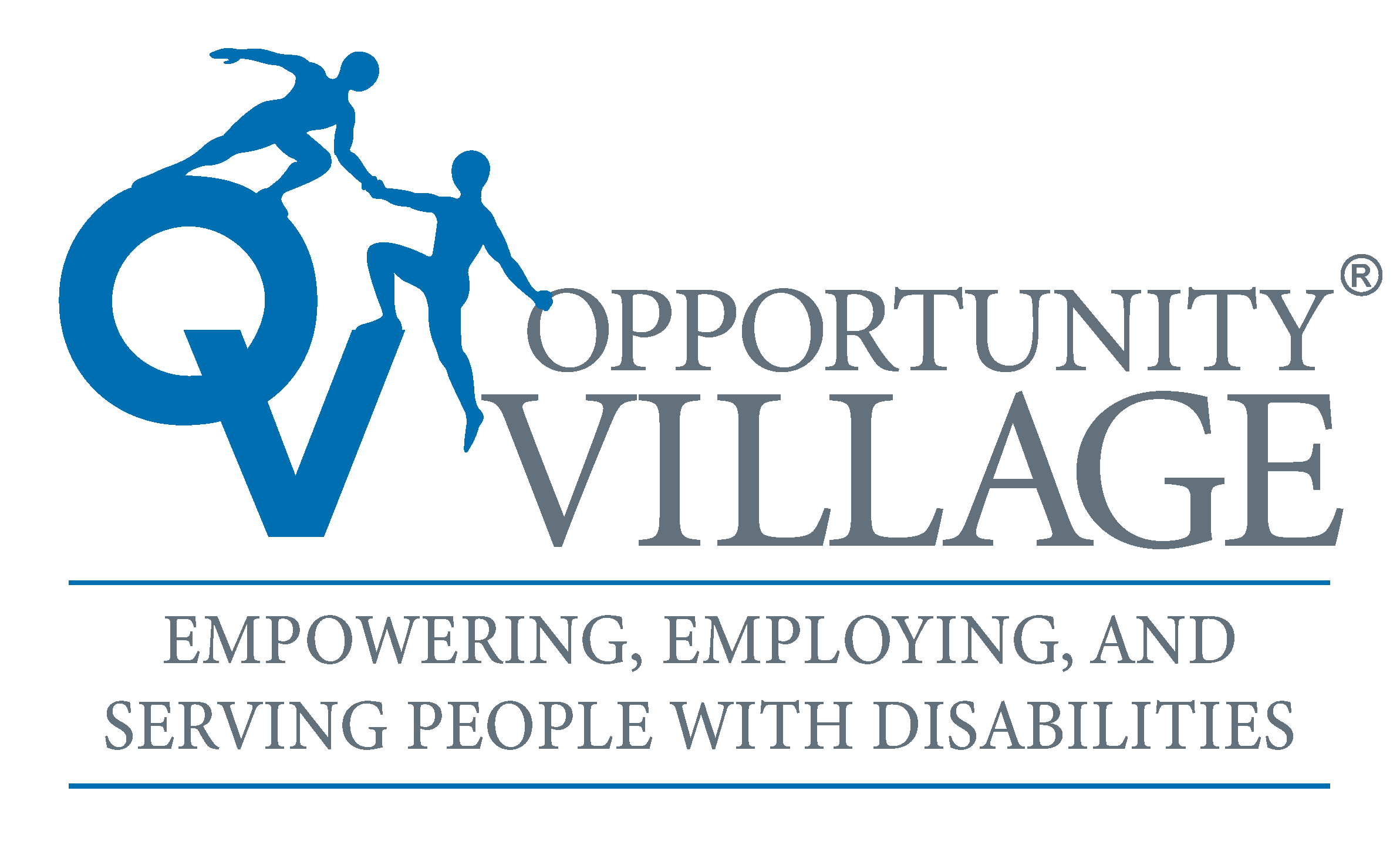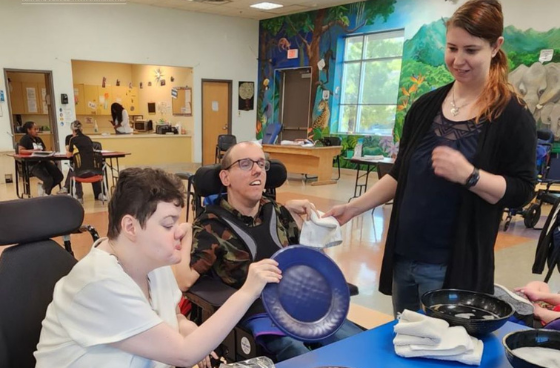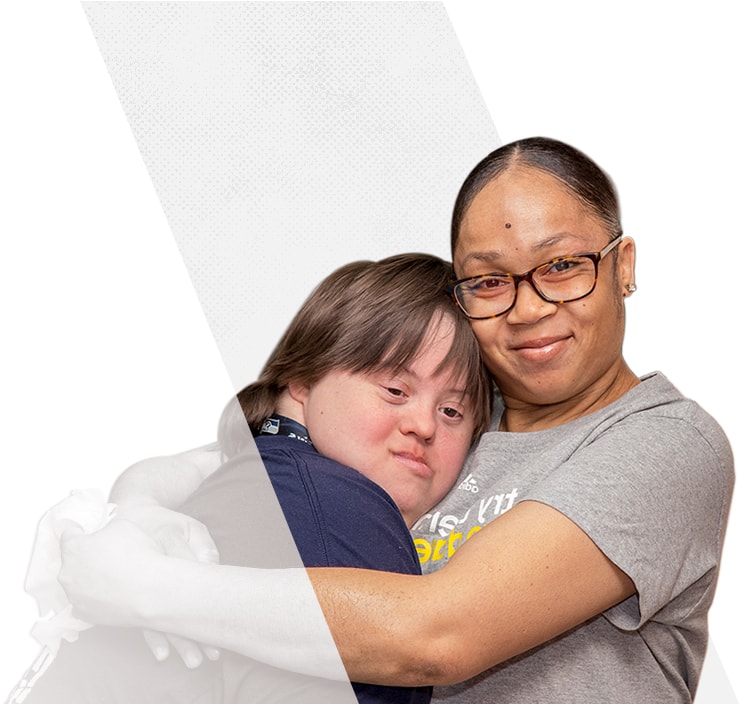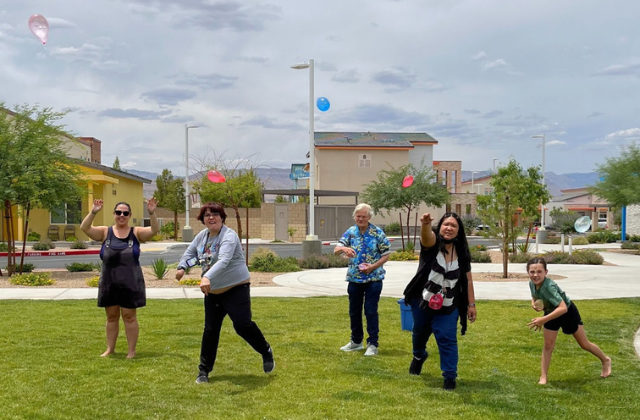
Caring for your loved one with an intellectual or developmental disability brings immense joy, but it can also come with challenges.
In this article, we’ll explore ways to strengthen your connection and enhance their well-being — through play therapy and physical activity.
Let’s dive in.
Can Adults Benefit from Play Therapy?
Absolutely! Play therapy isn’t just for kids.
It can work wonders for adults, too. Playing engages the mind, body and spirit, promoting mental and physical well-being. It fosters communication, reduces stress and enhances emotional regulation.
Whether it’s through games, creative arts or movement, the American Psychological Association says that play therapy offers a safe and supportive environment for growth and healing.
Why is Play Important for People with Special Needs?
Play isn’t just fun — it’s a fundamental human need.
For adults with intellectual or developmental disabilities, play allows for self-expression and growth. Research says that the simple act of playing creates a structured yet flexible environment where they can explore their emotions, build relationships and learn essential life skills.
Through play, they experience increased self-confidence and a sense of accomplishment.
What Activities Can You Do with Someone with a Disability?
Okay, let’s get to the fun part — the activities! You might wonder what kinds of activities are suitable for your loved one. So, let’s go over some games and activities that we love.
From physical movement to brain games and educational experiences, we’ll cover a range of adaptable activities to suit different needs and abilities. And you don’t always need to rely on your disability service provider or support service. Most of these are things you can do at home.
Let’s jump straight in — what are some physical activity games for adults with disabilities?
Physical Movement Games
1. Dance Party
Turn on some music and have a dance-off to get those muscles working and endorphins pumping. Dancing enhances motor skills, coordination and emotional expression. It’s a joyful way to exercise.
Benefits: Improved physical coordination, increased self-confidence and stress reduction. Dancing is also a social activity that encourages interaction.
Things to be aware of: Ensure your dance space is safe, free of obstacles and suitable for the participants. Be mindful of any physical limitations or discomfort.
Learning opportunities: Dance fosters creativity and rhythm. Participants can learn different dance styles and develop their own moves.
2. Sensory Play
Create a sensory bin with different textures and objects to explore. Sensory play can be calming and improve sensory processing.
Benefits: Enhanced sensory awareness, reduced anxiety and improved tactile sensitivity. It’s a versatile activity suitable for various abilities.
Things to be aware of: Ensure that the items in the sensory bin are safe and appropriate for the individual’s sensory preferences. Watch for any signs of sensory overload.
Learning opportunities: Sensory play encourages exploration and curiosity, helping participants become more in tune with their senses.
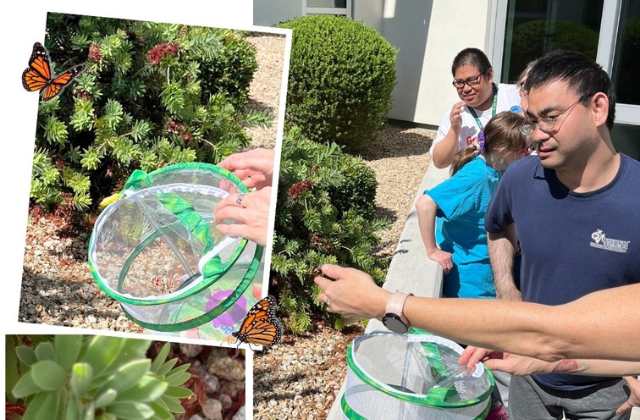
3. Nature Walks
Explore your local park or nature reserve. Nature walks stimulate the senses and encourage physical activity. And they’re usually relaxing. You could even search in your area for an inclusive and adaptive outdoor playground.
Benefits: Improved sensory awareness, stress reduction and enhanced physical fitness. Nature can be calming if you’re overstimulated in urban settings.
Things to be aware of: Make sure your route is accessible and suitable for the individual’s mobility level. Be prepared with appropriate clothing and supplies.
Learning opportunities: Nature walks offer opportunities to learn about the environment, identify plants and animals and connect with the natural world.
4. Balloon Volleyball
A fun sports game that enhances hand-eye coordination and teamwork. It’s a great way to get some exercise indoors. You can set up a simple volleyball game using a balloon as the ball. Create a net using a string or a low barrier.
Benefits: Enhanced coordination, social interaction, and teamwork skills. It’s a gentle way to engage in physical activity indoors.
Things to be aware of: Make sure the playing area is safe and there are no obstacles that could lead to accidents.
Learning opportunities: Participants learn to work together, follow rules and improve hand-eye coordination.
5. Chair Yoga
Gentle yoga poses adapted for seated participants can improve flexibility and lower stress.
Benefits: Improved flexibility, reduced stress and enhanced relaxation. It’s accessible for those with limited mobility.
Things to be aware of: Make sure participants are comfortable and have sturdy chairs for support.
Learning opportunities: Participants can learn yoga poses and breathing techniques that promote relaxation and mindfulness.
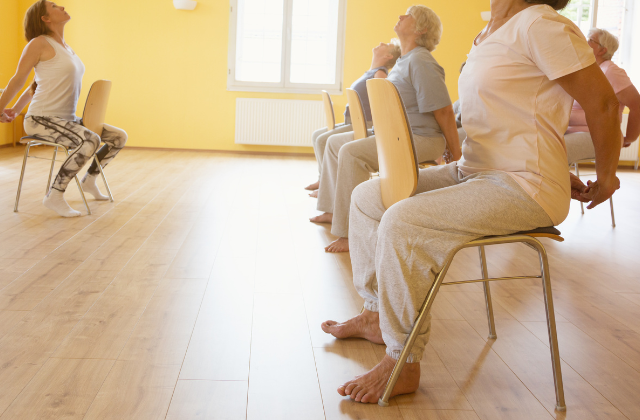
Brain Games
These brain games stimulate your mind and they’re fun and interactive. Tailor the games to suit your loved one’s interests and abilities, and embrace the opportunity to bond and challenge each other’s minds.
1. Memory Matching
Memory matching games involve flipping over cards to find matching pairs. You can use cards with pictures, symbols, or words. Enhance memory, concentration and cognitive skills.
Benefits: Improved memory retention, increased attention span and enhanced problem-solving abilities. It’s a game that fosters mental agility.
Things to be aware of: Ensure that the game’s difficulty level matches the participant’s cognitive abilities. Start with a smaller number of cards and increase complexity gradually.
Learning opportunities: Memory games boost memory recall and teach participants to recognize patterns.
2. Storytelling
Encourage creativity by starting a story, and let your loved one add to it. This activity boosts imagination and language skills.
Benefits: Enhanced creativity, improved language and communication skills and increased self-expression. It’s a collaborative activity that strengthens bonds.
Things to be aware of: Make sure the storytelling environment is comfortable and supportive, allowing participants to contribute freely.
Learning opportunities: Storytelling enhances vocabulary, comprehension and the ability to structure a narrative.
3. Puzzle Time
Jigsaw puzzles are fantastic for problem-solving and fine motor skills. Start with simpler puzzles and work your way up.
Benefits: Improved problem-solving abilities, enhanced focus and concentration, and a sense of achievement. It’s a calming and rewarding activity.
Things to be aware of: Ensure that the chosen puzzle’s complexity matches the participant’s abilities. Be patient and assist if needed.
Learning opportunities: Puzzles teach patience, perseverance and spatial awareness.

4. Board Games
Games like Scrabble or chess can develop better strategic thinking and support positive social interactions.
Benefits: Enhanced strategic thinking, improved social interaction, and cognitive stimulation. Board games are a great way to bond with others.
Things to be aware of: Select games that match the participant’s interests and cognitive abilities. Be supportive and patient.
Learning opportunities: Board games teach strategy, planning and decision-making.
5. Trivia Quiz
Create a quiz with questions related to their interests or favorite topics. Make it a fun and engaging activity to stimulate memory and knowledge.
Benefits: Improved memory, enhanced knowledge and cognitive stimulation. Trivia quizzes are a source of both learning and enjoyment.
Things to be aware of: Tailor the questions to the participant’s interests and knowledge level. Keep it light-hearted and enjoyable.
Learning opportunities: Trivia quizzes expand knowledge and encourage participants to share their expertise.
Now, let’s take a quick look at some structured experiences and therapy programs.
Educational Experiences
These educational experiences provide enriching opportunities for personal growth, skill development and emotional well-being. Customize the activity based on your loved one’s interests and abilities. Just wait until you see the positive impact it can have on their lives.
1. Music Therapy
Music therapy involves using music and musical activities to promote emotional, cognitive, and social well-being. It can enhance mood, reduce anxiety and improve communication skills. And it’s a powerful outlet for self-expression.
With music therapy, you can improve emotional regulation, enjoy social interaction and train your brain. Music therapy should be calming and enjoyable.
Things to be aware of: Choose music the participant enjoys to create a soothing atmosphere.
Learning opportunities: Music therapy offers opportunities for rhythm exploration, instrument play and vocal expression.
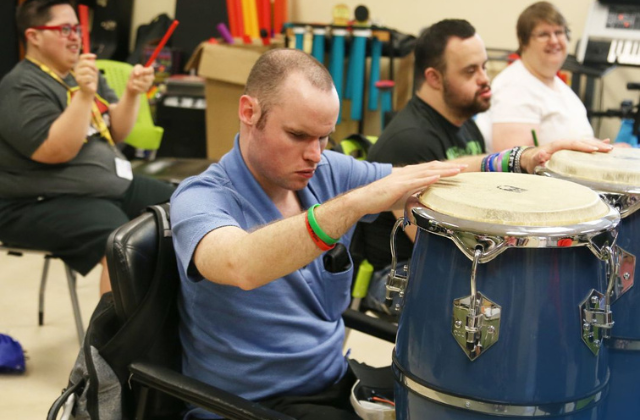
2. Art Therapy
Engaging in creative activities can help your loved one express themselves, reduce stress and build self-esteem. Try our popular Art Therapy program at Opportunity Village.
The benefits of Art Therapy are many and varied — you’ll notice things like improved emotional regulation, enhanced self-esteem and stress reduction. Art therapy also promotes self-awareness and can be really enjoyable.
Things to be aware of: Choose a trusted provider to ensure the art materials are safe and appropriate, and create a comfortable and supportive environment for freedom and creative expression.
Learning opportunities: Art therapy encourages participants to explore their feelings, communicate through art and develop new artistic skills.
3. Horticultural Therapy
Horticultural therapy involves gardening to reduce stress, improve mood and enhance sensory stimulation. Experience a connection to nature and a sense of accomplishment.
Gardening and dealing with plants has many benefits: improved fine motor skills, enhanced sensory awareness and emotional well-being. Horticultural therapy combines physical activity with a calming environment.
Things to be aware of: Adapt the gardening activities to the participant’s physical abilities and preferences.
Learning opportunities: Horticultural therapy provides opportunities to learn about plants, gardening techniques and the natural world. It builds a positive, can-do attitude as participants
watch seedlings successfully bloom.
4. Cooking Classes
Cooking classes can teach essential life skills and promote independence. Participants learn about healthy eating habits and to prepare simple meals and snacks. The classes also promote social interaction during meal preparation.
Things to be aware of: Choose recipes and cooking techniques that match the participant’s abilities and dietary restrictions.
Learning opportunities: Cooking classes teach meal planning, food safety and nutrition awareness.
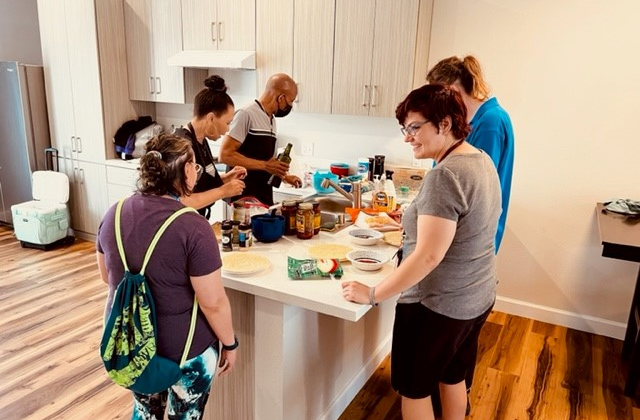
5. Animal-Assisted Therapy
Animal-assisted therapy involves interacting with trained therapy animals to promote emotional and social well-being. Animals give us a unique kind of emotional support and can help reduce stress, improve mood and enhance social skills. Animal-assisted therapy fosters a sense of connection and empathy.
Things to be aware of: Ensure that the therapy animals are well-trained and that participants are comfortable with them.
Learning opportunities: Animal-assisted therapy can teach responsibility, empathy and animal care.
Recap: Why Choose Play?
Play therapy and physical movement are powerful tools to enhance well-being. They can improve your loved one’s health, boost cognitive skills and provide emotional support. Take the opportunity to connect and grow together.
Read more about our day habilitation programs that offer a range of enriching activities and support for adults with disabilities. Or take a tour to see what OV offers adults with disabilities. We focus on empowerment, skill-building and socialization.
Discover more activities and hobbies for adults with disabilities, and remember, play isn’t just a pastime — it’s a pathway to empowerment, connection and growth.
